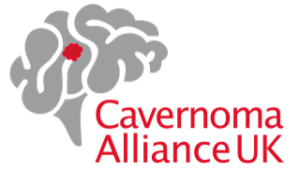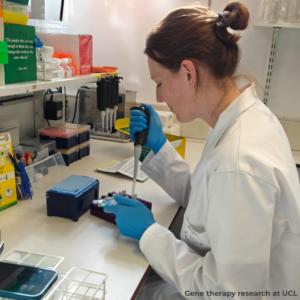Gene Therapy
Research
Gene therapy is an exciting new area of research that aims to treat the genetic cause of familial cavernoma, which affects around 20% of people with the condition. CAUK, in partnership with Cavernoma Ireland and a philanthropist, is funding the UK’s first gene therapy project at University College London (UCL). The research is at an early proof of concept stage, with a long-term horizon of around 10 years before treatment is available in clinic. This section tells you more about this pioneering research.
Since 2024, Cavernoma Alliance UK (CAUK) has helped to secure over £150,000 of funding for pioneering gene therapy research project for cerebral cavernous malformations (CCM), the first of its kind in the UK.
This international research effort is being led by University College London (UCL) in collaboration with Uppsala University in Sweden, and has been made possible thanks to a partnership between CAUK, Cavernoma Ireland, and a philanthropist with a personal connection to cavernoma.
It marks a significant first step in exploring long-term treatment options for familial cavernoma, a genetic form of the condition that affects around 20% of people diagnosed with cavernoma. Familial cavernoma is usually, though not always, marked by the presence of multiple cavernomas in the brain or spinal cord and is caused by inherited changes in one of three genes: CCM1, CCM2, or CCM3.
What is gene therapy?
Gene therapy aims to correct or replace faulty instructions in our DNA. In the case of familial cavernoma, changes in one of the CCM genes can disrupt how blood vessels form and function – leading to the development of multiple lesions.
As explained by UCL researcher’s Dr Rajvinder Karda and Dr Ellie Chilcott:
“Think of DNA like a letter containing important instructions. The cell is the delivery address. Gene therapy works by packaging corrected instructions – often using a harmless virus – and delivering them to the right cells in the body.”
This approach has already shown promise in treating other genetic and neurological conditions – and this project is the first time it’s being applied to cavernoma in the UK.
Where are we now?
As of 2026, the project is at the proof of concept stage – the earliest phase of scientific research, with researchers testing whether the core idea behind a treatment is technically and biologically sound.
The UCL team, led by Professor Rajvinder Karda and Dr Ellie Chilcott, is currently working through a number of key steps, including:
- Cloning the necessary DNA constructs
- Producing a safe, genetically modified virus to carry the therapy to cells
- Testing the treatment in mice to track how it moves through the body and whether it behaves as intended
This work is being carried out in partnership with vascular biologist Associate Professor Peetra Magnusson and Dr Favour Onyeogaziri from Uppsala University.
An international collaboration
Getting this project underway took more than financial backing. CAUK dedicated a year of time and coordination with Cavernoma Ireland to help bring the right partners together, shape the research goals, and support early planning.
CAUK and Cavernoma Ireland continue to work alongside the research team. This long-term involvement helps ensure the research remains grounded in the needs of people living with cavernoma. To find out more about Cavernoma Ireland, please go to www.cavernomaireland.ie. Both organisations are members of the European Cavernoma Alliance with more information available here.

A long term vision
Gene therapy is a long-term investment. This project is at the very beginning of that journey, and it is expected to take 10 years before any treatment might be available for people living with familial cavernoma.
There are many phases still to come, from pre-clinical testing to clinical trials, regulatory approval, and eventually, access for people with cavernoma. But this marks a critical first step toward a future where the underlying genetic cause of familial cavernoma might be treated, not just its symptoms.
We are proud to support this project and the dedicated scientists behind it, and we will continue to keep our community informed as the work progresses.
If you would like to help make this research possible, please consider setting up a monthly donation or making a one-off gift. You can donate online here or email admin@cavernoma.org.uk for our bank details.


